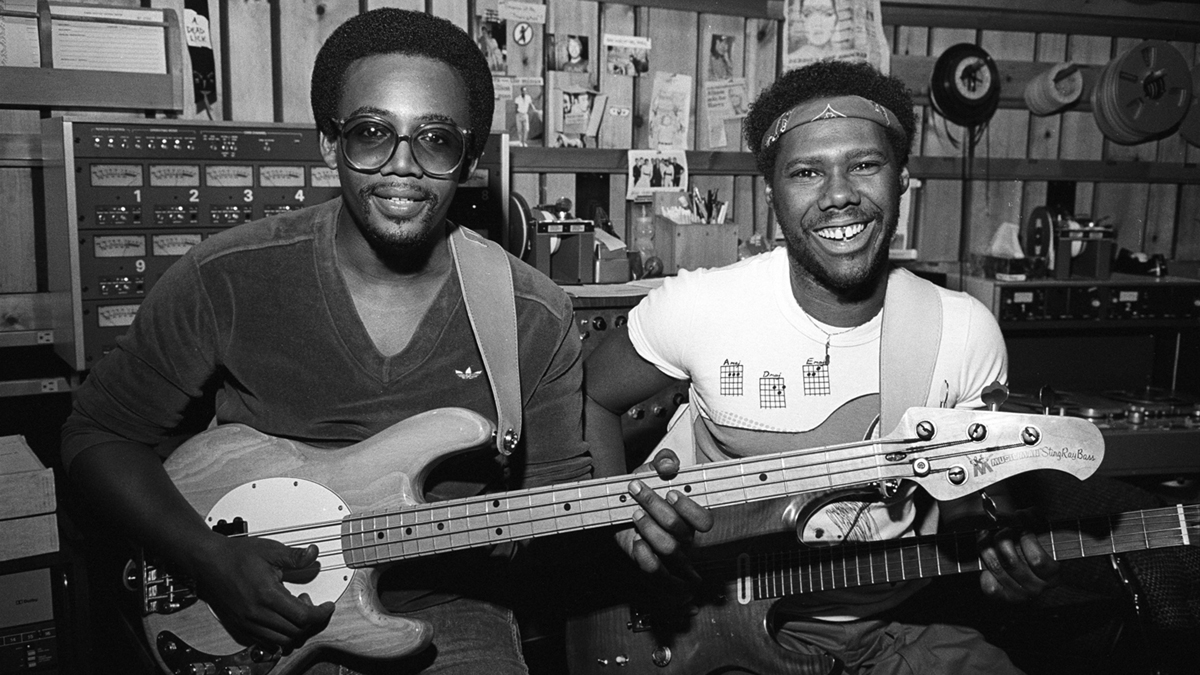
Along with guitarist Nile Rodgers, the late Bernard Edwards helped define one of the most distinctive sounds of disco – the sparse, sophisticated, yet highly rhythmic groove of Chic. Much like the emergence of Sting's Police under the guise of punk, Edwards and Rodgers brought Chic out from under the glare of the disco lights to create something far more substantial and enduring.
Such late-‘70s smashes as Good Times, Le Freak, and Everybody Dance, as well as the Chic-produced hits We Are Family and I'm Coming Out, were grounded by Edward’s 'chucking' bass technique, where he emulated holding a pick and then struck the strings with both nail and finger.
“Bernard was a guitar player before he played the bass guitar,” Nile Rodgers told BP. “But the last thing he wanted to be was a bass player who used a pick. So he played with his forefinger and thumb, like he was holding a pick. He’d strike the string with the bottom and top of his finger. The strength of the low-end comes from his thumb on top and the other three fingers curled up underneath, so he had the fattest pick you could ever imagine!”
In his lone Bass Player interview back in September 1992, Edwards revealed that his subtly sophisticated sub-hooks were mostly a reaction to the 'chicken-scratch' guitar parts of Nile Rodgers. “I consider the two of us a rhythm section, even without drums, because we keep so much rhythm going. My basslines are usually a reaction to his guitar rhythms.”
Rodgers later clarified: “What he didn't mention is he wouldn't start playing bass until I came up with something that he liked! If he played along, I knew the song was going to be cool because Bernard was ten times hipper than everyone else.”
Le Freak, a 1978 hit from the album C’est Chic was written on New Year's Eve 1977, Rodgers recalled, “after Grace Jones invited Bernard and me to Studio 54. We weren't able to get inside, so we bought some champagne and went round the corner to my place to celebrate and jam instead. I came up with the riff because I was singing, ‘fuck off!’ To vent my frustration. We softened it to 'Freak Off!’ and then, remembering a dance craze at the time called ‘The Freak’, we arrived at ‘Freak Out!’ Bernard just started accenting the ‘Freak Out!’ part.”
Relentless eighth- and 16th-note octaves were the disco norm at the time, but Edwards employed the octave as a stylish flourish. To usher in the verse, he plays an ultra-cool octave riff followed by a chromatic walk-up to the tonic. Note how the bass alternates between staccato downbeats and slides.
In the verse riff itself, Edwards used hammer-ons to mirror and embellish the guitar part, while continuing to incorporate the ‘Freak Out!' motif in his approach to the downbeat. “That subtle expressiveness with regard to note length and use of space is what Bernard's style was all about,” said Rogers. “We viewed every song as a linear journey, with a beginning, middle, and end – but what made the journey interesting was the different places we visited along the way.”
As with all Chic tunes, the rhythm section went in first and recorded live, using notated charts that allowed for vocal, string, and horn tracks to be added later. Edwards plugged his late-‘70s Music Man StingRay (with old roundwound strings) direct into the board. As co-producer, he was further able to shape his sound with the help of bass-playing engineer Bob Clearmountain, who mixed Chic's early albums. The part contains no punch-ins.
After Chic split up in the early ‘80s, Edwards went on to produce Rod Stewart, Robert Palmer, and Power Station, with Rodgers doing the same for David Bowie, Madonna, and Duran Duran. In 1992, the duo reunited for Chic-ism. A new edition of Chic began playing sold-out shows across Japan in 1995.
It was at the end of one of those tours, in 1996, that Edwards, weakened by cancer few knew about, succumbed to pneumonia at age 43.
“At the last show of the tour, Bernard passed out during a verse of Let's Dance, and when the bass stopped it happened in such a hip place that I thought, ‘Wow, I wonder why we didn't do the record like that?’ He recovered and came in exactly six bars later. I turned around and gave him the thumbs-up, not knowing he had passed out! That's how he was; everything he did was musical.”
Rodgers discovered Edwards’ body in his hotel room the next day. “Obviously it was a painful shock, but I quickly realised he went out the way he wanted: playing his music with his best friend.”







